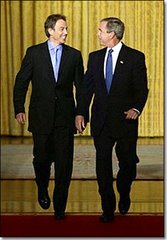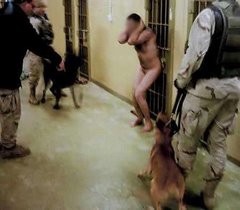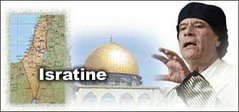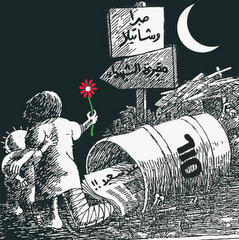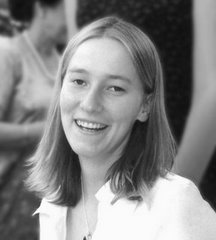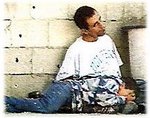Islamic Banking: Steady in Shaky Times
Principles Based on Religious Law Insulate Industry From Worst of Financial Crisis
JIDDAH, Saudi Arabia -- As big Western financial institutions have teetered one after the other in the crisis of recent weeks, another financial sector is gaining new confidence: Islamic banking.
Proponents of the ancient practice, which looks to sharia law for guidance and bans interest and trading in debt, have been promoting Islamic finance as a cure for the global financial meltdown.
This week, Kuwait's commerce minister, Ahmad Baqer, was quoted as saying that the global crisis will prompt more countries to use Islamic principles in running their economies. U.S. Deputy Treasury Secretary Robert M. Kimmet, visiting Jiddah, said experts at his agency have been learning the features of Islamic banking.
Though the trillion-dollar Islamic banking industry faces challenges with the slump in real estate and stock prices, advocates say the system has built-in protection from the kind of runaway collapse that has afflicted so many institutions। For one thing, the use of financial instruments such as derivatives, blamed for the downfall of banking, insurance and investment giants, is banned. So is excessive risk-taking.
Proponents of the ancient practice, which looks to sharia law for guidance and bans interest and trading in debt, have been promoting Islamic finance as a cure for the global financial meltdown.
This week, Kuwait's commerce minister, Ahmad Baqer, was quoted as saying that the global crisis will prompt more countries to use Islamic principles in running their economies. U.S. Deputy Treasury Secretary Robert M. Kimmet, visiting Jiddah, said experts at his agency have been learning the features of Islamic banking.
Though the trillion-dollar Islamic banking industry faces challenges with the slump in real estate and stock prices, advocates say the system has built-in protection from the kind of runaway collapse that has afflicted so many institutions। For one thing, the use of financial instruments such as derivatives, blamed for the downfall of banking, insurance and investment giants, is banned. So is excessive risk-taking.
The beauty of Islamic banking and the reason it can be used as a replacement for the current market is that you only promise what you own. Islamic banks are not protected if the economy goes down -- they suffer -- but you don't lose your shirt," said Majed al-Refaie, who heads Bahrain-based Unicorn Investment Bank.
The theological underpinning of Islamic banking is scripture that declares that collection of interest is a form of usury, which is banned in Islam। In the modern world, that translates into an attitude toward money that is different from that found in the West: Money cannot just sit and generate more money. To grow, it must be invested in productive enterprises.
The theological underpinning of Islamic banking is scripture that declares that collection of interest is a form of usury, which is banned in Islam। In the modern world, that translates into an attitude toward money that is different from that found in the West: Money cannot just sit and generate more money. To grow, it must be invested in productive enterprises.
"In Islamic finance you cannot make money out of thin air," said Amr al-Faisal, a board member of Dar al-Mal al-Islami, a holding company that owns several Islamic banks and financial institutions. "Our dealings have to be tied to actual economic activity, like an asset or a service. You cannot make money off of money. You have to have a building that was actually purchased, a service actually rendered, or a good that was actually sold."
In the Western world, bankers designing investment instruments have to satisfy government regulators. In Islamic banking, there is another group to please -- religious regulators called a sharia board. Finance lawyers work closely with Islamic finance scholars, who study and review a product before issuing a fatwa, or ruling, on its compliance with sharia law.
Islamic bankers describe depositors as akin to partners -- their money is invested, and they share in the profits or, theoretically, the losses that result. (In interviews, bankers couldn't recall a case in which depositors actually lost money; this shows that banks put such funds only in very low-risk investments, they said.)
Rather than lend money to a home buyer and collect interest on it, an Islamic bank buys the property and then leases it to the buyer for the duration of the loan. The client pays a set amount each month to the bank, then at the end obtains full ownership. The payments are structured to include the cost of the house, plus a predetermined profit margin for the bank.
Sharia-compliant institutions also cannot invest in alcohol, pornography, weapons, gambling, tobacco or pork.
Computer engineer Tarek al-Bassam said the crisis made him glad that he had chosen an Islamic bank to take his money। His Islamic savings account has made about 4 percent profit, he said. "Usually it's a very low risk or a very low gain. But I'm happy with it," Bassam said.
In the Western world, bankers designing investment instruments have to satisfy government regulators. In Islamic banking, there is another group to please -- religious regulators called a sharia board. Finance lawyers work closely with Islamic finance scholars, who study and review a product before issuing a fatwa, or ruling, on its compliance with sharia law.
Islamic bankers describe depositors as akin to partners -- their money is invested, and they share in the profits or, theoretically, the losses that result. (In interviews, bankers couldn't recall a case in which depositors actually lost money; this shows that banks put such funds only in very low-risk investments, they said.)
Rather than lend money to a home buyer and collect interest on it, an Islamic bank buys the property and then leases it to the buyer for the duration of the loan. The client pays a set amount each month to the bank, then at the end obtains full ownership. The payments are structured to include the cost of the house, plus a predetermined profit margin for the bank.
Sharia-compliant institutions also cannot invest in alcohol, pornography, weapons, gambling, tobacco or pork.
Computer engineer Tarek al-Bassam said the crisis made him glad that he had chosen an Islamic bank to take his money। His Islamic savings account has made about 4 percent profit, he said. "Usually it's a very low risk or a very low gain. But I'm happy with it," Bassam said.
He has also borrowed from an Islamic bank, to buy a building. Even if he's late in his payments, he said, he will not have to pay cumulative interest or a larger sum than the one agreed upon. But he notes that under this system, it can be harder to get a loan than from a conventional bank. Islamic banks have stricter lending rules and require that their borrowers provide more collateral and have higher income.
Islamic banking has grown by about 15 percent a year since its modern inception in the 1970s, fueled by the Middle East oil boom of that decade. "There was a lot of hostility when we first started out. We were regarded with suspicion, especially by the regulatory authorities. We were an odd fish. Authorities only acquiesced when they saw the huge demand," said Dar al-Mal al-Islami's Faisal, who has been in Islamic finance since the late 1970s.
Islamic finance now accounts for about 1 percent of the global market, according to Majid Dawood, chief executive of Yasaar, a Dubai-based sharia financing consultancy. "We had expected to be at 12 percent of the global market by 2025, but now with this financial crisis, we expect to get there much faster," he said in a telephone interview from New York, where he was speaking at a conference on Islamic banking.
Growth in Islamic banking picked up even before the current financial crisis, mainly because of strong client demand for safe, religiously acceptable investments and a recent explosion in new and innovative financial instruments, said Jane Kinninmont, an analyst at the Economist Intelligence Unit, a research and advisory company।
Islamic banking has grown by about 15 percent a year since its modern inception in the 1970s, fueled by the Middle East oil boom of that decade. "There was a lot of hostility when we first started out. We were regarded with suspicion, especially by the regulatory authorities. We were an odd fish. Authorities only acquiesced when they saw the huge demand," said Dar al-Mal al-Islami's Faisal, who has been in Islamic finance since the late 1970s.
Islamic finance now accounts for about 1 percent of the global market, according to Majid Dawood, chief executive of Yasaar, a Dubai-based sharia financing consultancy. "We had expected to be at 12 percent of the global market by 2025, but now with this financial crisis, we expect to get there much faster," he said in a telephone interview from New York, where he was speaking at a conference on Islamic banking.
Growth in Islamic banking picked up even before the current financial crisis, mainly because of strong client demand for safe, religiously acceptable investments and a recent explosion in new and innovative financial instruments, said Jane Kinninmont, an analyst at the Economist Intelligence Unit, a research and advisory company।
Islamic banks now offer credit cards in which the full balance must be paid off at month's end. They have devised a kind of commercial paper known as sukuk, which generates a predetermined return that is called a profit, not interest. It is tied to a specific asset and conveys ownership of it. A sukuk might be issued by a government or a company that is building a hospital or a bridge, for example.
Work in Islamic banking by the King & Spalding law firm has grown roughly 40-fold in the past four years, according to Jawad Ali, a Dubai-based partner at the firm. The firm has 35 lawyers "who do nothing but structure sharia-compliant investment and financing on a daily basis," he said.
Islamic finance first sparked interest in the United States in the late 1990s. The Dow Jones Islamic Index was established in 1999, and the Dow Jones Islamic Fund, which invests in sharia-compliant companies, the following year.
But interest cooled after some Islamic banks were accused of financing terrorism in a lawsuit filed by family members of Sept. 11, 2001, victims, and a lot of Persian Gulf money left the United States for Europe.
In 2004, the German state of Saxony-Anhalt issued a 100 million-euro sovereign Islamic bond. That same year, the first Islamic bank opened in Britain, which now has six Islamic financial institutions, including a retail bank.
Although the biggest Islamic banks are in the Persian Gulf -- Dubai Islamic Bank, Kuwait Finance House and Saudi Arabia's al-Rajhi Bank -- Malaysia and London are growing as major centers of Islamic banking as well.
Islamic institutions are not immune to ills plaguing other banks, such as corruption charges and bad investments. Differences of interpretation between sharia scholars about what is permissible and what isn't also create confusion. The sukuk market, which had doubled each year since 2004, growing to a total of about $90 billion in bonds issued, fell 50 percent this year after a Bahrain-based group of Islamic scholars decreed that most of the bonds were not compatible with sharia law.
But as banks turn borrowers away in these times of economic turmoil, Islamic institutions continue to close deals in Europe, the Gulf and the United States, bankers said. "Banks feel safer and more comfortable with us because we put down more money, more equity. We are not allowed to borrow with very little down," said Tariq Malhance, a former chief financial officer for the city of Chicago who now heads Unicorn Investment Bank's U.S. office.
And those who have been in Islamic banking for a long time now feel vindicated.
"The current financial collapse is an opportunity. The ugly side of Wall Street is exposed; it's always been there but covered by a layer of glamour that is now stripped away," Faisal said. "We are more conservative and sober in our investments. That used to be considered a handicap. Now it's considered the height of wisdom."
Work in Islamic banking by the King & Spalding law firm has grown roughly 40-fold in the past four years, according to Jawad Ali, a Dubai-based partner at the firm. The firm has 35 lawyers "who do nothing but structure sharia-compliant investment and financing on a daily basis," he said.
Islamic finance first sparked interest in the United States in the late 1990s. The Dow Jones Islamic Index was established in 1999, and the Dow Jones Islamic Fund, which invests in sharia-compliant companies, the following year.
But interest cooled after some Islamic banks were accused of financing terrorism in a lawsuit filed by family members of Sept. 11, 2001, victims, and a lot of Persian Gulf money left the United States for Europe.
In 2004, the German state of Saxony-Anhalt issued a 100 million-euro sovereign Islamic bond. That same year, the first Islamic bank opened in Britain, which now has six Islamic financial institutions, including a retail bank.
Although the biggest Islamic banks are in the Persian Gulf -- Dubai Islamic Bank, Kuwait Finance House and Saudi Arabia's al-Rajhi Bank -- Malaysia and London are growing as major centers of Islamic banking as well.
Islamic institutions are not immune to ills plaguing other banks, such as corruption charges and bad investments. Differences of interpretation between sharia scholars about what is permissible and what isn't also create confusion. The sukuk market, which had doubled each year since 2004, growing to a total of about $90 billion in bonds issued, fell 50 percent this year after a Bahrain-based group of Islamic scholars decreed that most of the bonds were not compatible with sharia law.
But as banks turn borrowers away in these times of economic turmoil, Islamic institutions continue to close deals in Europe, the Gulf and the United States, bankers said. "Banks feel safer and more comfortable with us because we put down more money, more equity. We are not allowed to borrow with very little down," said Tariq Malhance, a former chief financial officer for the city of Chicago who now heads Unicorn Investment Bank's U.S. office.
And those who have been in Islamic banking for a long time now feel vindicated.
"The current financial collapse is an opportunity. The ugly side of Wall Street is exposed; it's always been there but covered by a layer of glamour that is now stripped away," Faisal said. "We are more conservative and sober in our investments. That used to be considered a handicap. Now it's considered the height of wisdom."





